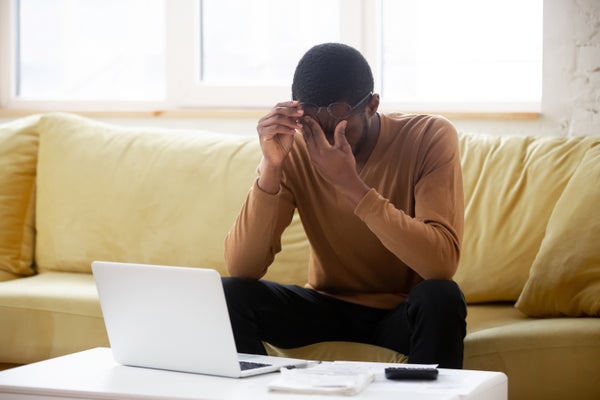For months, Desmond Ellington assiduously refused to watch the videotaped killing of George Floyd. When former Minneapolis police office Derek Chauvin went on trial for his murder, Ellington did not turn on the television until he saw a headline on his smartphone that the verdict would be announced within the hour. It was not that he did not care about what was happening; it was that he cared too much.
For the 37-year-old Black singer and actor, the news accounts and social media videos of racial violence and the killings of unarmed Black people that too often go unpunished were not just demoralizing, they were traumatizing. “It gets to the point where you decide, ‘I have to turn off the television because I have my sanity to take care of,’” says Ellington, an Arkansas native who lives in New York. “It’s like a sadness, a hopelessness. Those images just keep coming like weeds. You pick one weed, and two more sprout up. So you gonna set the whole yard on fire to kill the weeds? It wears on your psyche.”
A growing body of research has documented the detrimental effects of both interpersonal and structural racism. The Centers for Disease Control and Prevention notes that centuries of racism have had a profound and negative impact on the mental and physical health of people of color. Investigators at Columbia University found that experiencing racism can result in traumatic stress linked to negative mental health outcomes, such as depression, anger and low self-esteem. The American Public Health Association calls racism a social determinant of health akin to housing, education, and employment and a barrier to health equity.
On supporting science journalism
If you're enjoying this article, consider supporting our award-winning journalism by subscribing. By purchasing a subscription you are helping to ensure the future of impactful stories about the discoveries and ideas shaping our world today.
A study recently published in the Proceedings of the National Academy of Sciences USA adds a new layer to an understanding of the pervasive health effects of racism. Lead author David Curtis of the University of Utah and his colleagues showed that widely publicized anti-Black violence negatively affects the mental health of many Black Americans even if they do not directly experience it.
The study’s authors conducted the first nationwide scientific assessment of these media reports using 49 high-profile incidents that occurred between 2013 and 2017. They included media reports of 38 police killings of Black individuals, as well as coverage of about nine legal decisions not to indict or convict officers involved in some of those killings.
Using weekly data from the Behavioral Risk Factor Surveillance System survey, the researchers assessed the mental health impacts on people during this period. Black respondents reported more poor mental health days during the time when two or more of these events happened in the country. Legal decisions not to prosecute or convict the officers involved in the killings were most clearly associated with poor mental health days, Curtis says. This reflects Black people’s concern and dismay about what they see as the systemic injustice that follows a much publicized incident and the failure to hold anyone accountable more than their reaction to the initial wrong perpetrated by any single individual.
Those emotions also resonate with personal experiences in which racism is ever present. As a senior operations engineer who is starting a job at Amazon later this month, 26-year-old Adam Williams works in a field in which Black people are dramatically underrepresented. That mirrors his life on a college campus just a few years ago. When he graduated from Purdue University in 2017, just 1.6 percent of the students in the College of Engineering were Black, a statistic that figured into the way he was perceived.
Initially, none of Williams’s classmates wanted to be his lab partner, and they seemed shocked when he answered questions correctly in class. “I saw Nazi propaganda scattered across campus detailing how I was genetically inferior,” he says of literature disparaging Black people. “I was hastily labeled a delinquent, followed through stores, questioned by police under bogus pretenses and frequently assumed that the only way I could be at Purdue was as an athlete.”
For his part, Ellington considers himself lucky to have encountered little overt and direct racism. Yet despite achieving a measure of professional success and traveling the country as a member of the cast of Hamilton, he cannot shake the feeling that he is just one wrong move away from becoming another statistic.
“I’m still very aware that it could happen to me,” he says. “I have to know how to conduct myself when I’m out. I’m always thinking, ‘Am I walking or standing too close to this person?’ It’s a burden that I have to be in that box so I can get back home to my family. It’s so emotionally and physically draining. You don’t even realize how much until you see another Black man get shot. I think it’s in those moments you realize how much of a burden it is to be Black in America.”
Psychologist Vanessa Volpe runs the Black Health Lab at North Carolina State University, where she studies the impact of direct and vicarious racism on physical health. She compares the kind of hypervigilance Ellington talks about—trying to navigate the thicket of structural, systemic and interpersonal racism—to driving a car with the parking brake on.
“Because exposure to racism is chronic, frequent and can happen at any time, you have to be vigilant to protect yourself,” Volpe says. “Over time, your body is going to experience this wear and tear that will result in much greater rates of morbidity and earlier mortality for Black folks, compared to white people. A lot of times we think, ‘Just get a better car or replace the parking brake,’ but that’s a Band-Aid. What can we do so that Black people don’t even have that exposure in the first place?”
